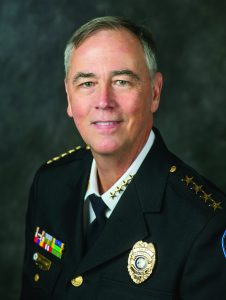
Thomasville Police Department, Georgia
As police leaders, one of the most important responsibilities we have to our agencies and our communities is the development and mentorship of our officers.
It is our job to not only recruit and develop officers but to also mentor future law enforcement leaders. I, like so many of us, would not be a police chief today if it had not been for the mentorship I have received during my over four decades in law enforcement. We need to develop the next generation and focus future leaders toward advancing the important work of police agencies as part of our overall vision of shaping the future of the policing profession.
As our profession continues to face a recruitment and retention challenge that will likely last into the future, it is imperative that we provide the promise of professional and personal development to new recruits, while we mentor those already in our ranks. Mentoring promotes professional growth, inspires personal motivation, and enhances effectiveness of police services. It benefits not only the protégé but also the mentor themself. Part of succession planning and a responsibility for every leader is to mentor not only up-and-coming leaders but new command staff—and even new chiefs in other agencies.
These themes were reinforced recently in a roundtable discussion of transforming the organizational culture of police agencies that included police leaders from around the globe. The value of such an event lies in the opportunity for participants to learn from one another and discuss challenges, opportunities, and promising practices from across our profession. Police leaders inevitably face numerous and ongoing challenges, but they don’t have to manage them alone. Even across drastically different contexts, police leaders face commonalities and shared experiences. Mentoring allows police leaders to apply others’ lessons learned to the paths they chart for themselves. Mentoring others, in turn, to realize their capability to advance the profession and impact public safety is imperative to creating lasting change and fostering continual progress, while preparing for the challenges of the future through effective leadership.
“We all have the responsibility to mentor and develop our officers.”
The beginning of any new police chief’s administration can be crucial to achieving a successful transition and to building important relationships within the agency and the community. The new responsibilities that come with assuming the helm as the leader can be overwhelming, confusing, and challenging. Newer chiefs need technical assistance and support from those who have a wealth of knowledge and experience. I have had the benefit of someone who saw a potential in me that I did not see and would not have realized on my own. A supervisor, commander, and leader who held me accountable when I didn’t appreciate it, Chief Douglas Nordquist (Ret.) put me in positions to learn when I didn’t want to be transferred and gave me advice that I didn’t ask for, but, in looking back, I am thankful for his leadership and mentorship. In fact, when deciding who would swear me in as the IACP president last October in Dallas, Texas—in other words, answering the question “Who has had the most impact and influence on my career?”—the answer was obvious. I am honored that Chief Nordquist agreed to take on this important and meaningful role. I still use what I learned from my mentor when I teach leadership classes and seminars because, as we know, good leadership is timeless and needs to be passed on.
During a trip to Toronto, Canada, for a Critical Issues Forum with the Canadian Association of Chiefs of Police (CACP), I learned about the CACP Police Executive Mentorship Program, which is designed to enhance the knowledge, skills, and abilities of senior-level executives such as deputy chiefs, superintendents, or the equivalent who have a career goal of becoming a top law enforcement leader. These are the types of programs in which we need to encourage our leaders of tomorrow to participate. It does not make a difference what country you serve in; we all have the responsibility to mentor and develop our officers. Investment in good policing and good succession planning is what our communities expect and what our communities deserve.
From the perspective of leadership and the responsibility to prepare the next generation, the IACP strives to develop police leaders at all levels of an organization and offers several resources and trainings to teach police leaders how to develop and mentor their staff, both sworn and civilian. Take advantage of the Smaller Department Section and the Division of State Associations of Chiefs of Police (SACOP) Mentor Match Program. The IACP also provides training courses like Leadership in Police Organizations, which delivers modern behavioral science concepts and theories uniquely tailored to the law enforcement environment. Register for the Women’s Leadership Institute, a training program for women leaders and those developing women leaders or the First-Line Leadership training, which provides sworn and civilian first-line supervisors with the tools and strategies to good decision making. The IACP’s Institutionalizing Mentoring Into Police Departments Best Practices Guide can help you create a mentoring program or develop a mentoring environment in your agency. I encourage you to take advantage of these programs and resources to help train your leaders of tomorrow and to serve as a mentor to help others do the same.

Mentorship does not end in retirement. Retired chiefs can and should take advantage of the opportunity to continue mentoring and developing leaders who are still serving in the profession. The IACP Retired Chiefs Section allows members, often with decades in law enforcement, to share their experiences and mentor the next generation. We can still contribute to the profession we have dedicated our lives to, even after we step down from actively serving.
Every police leader needs a mentor in their professional life, so they are prepared when that figurative “tap on the shoulder” occurs. Maybe that is you. I hope you are prepared to mentor that leader of tomorrow because the future of our profession—and the safety in our communities—depends on it. d
Please cite as
John Letteney, “Mentoring and Development for Continual Progress,” President’s Message, Police Chief 90, no. 8 (August 2023): 6–7.


